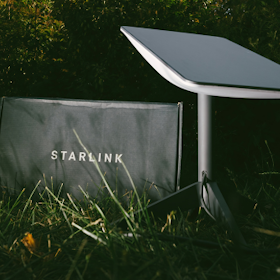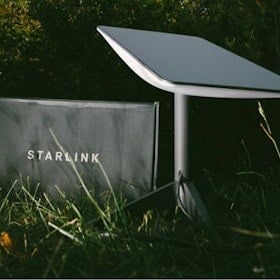Find the Best Internet Plan Today
Everything you need to find the right internet plan
Types of Internet Plans
Internet Providers by Provinces and Territories
- Internet in Alberta
- Internet in British Columbia
- Internet in Manitoba
- Internet in New Brunswick
- Internet in Newfoundland and Labrador
- Internet in Northwest Territories
- Internet in Nova Scotia
- Internet in Nunavut
- Internet in Ontario
- Internet in Prince Edward Island
- Internet in Quebec
- Internet in Saskatchewan
- Internet in Yukon Territory
Choose the Right Internet Plan
You may think that your only choices for high-speed internet are your local telephone company and your local cable provider. You’re not alone. In a 2021 survey, WhistleOut Canada found that 58% of Canadians were unaware of reseller ISPs that offer the same services but for cheaper rates.
Fortunately, WhistleOut's internet guides break down the most important considerations you have when picking the right internet plan, including data caps, speed, and availability. We then show you all the options available in your area, accurate down to the postal code.
The amount of data you need depends on the number of devices in your household and how you use them. Unlimited plans are great options for families and data-heavy households that don't want to worry about overages or slowdowns. However, cheap plans with limited data can be perfect for a home that uses the internet for simple email, video chat, and web browsing.
The same goes for your download speed—the faster your plan, the more simultaneous connections your internet connection can support without encountering the dreaded buffering wheel.

Also, you’ll want to make sure your chosen internet plan is available near you! Significant ISPs like Bell and Rogers are widely available in eastern Canada, while Shaw and Telus internet plans are standard throughout the western provinces. Don't have a major provider in your area? Smaller regional providers serve rural and remote Canadians with affordable high-speed internet plans.
Before going any further:
Arm yourself with details about your current internet service.
- Dig out (and read!) your last few internet bills.
- Older bills help you see if your rates have changed.
- Recent bills show you how much you’re spending and what bundled services or discounts you may have.
- Consider your other services—including live IPTV, telephone, smart home security, and cell phone service—that you can bundle to save even more.
- Check your existing home internet speed with our exclusive WhistleOut Speed Test.
Major Internet Providers in Canada
There are typically two types of telecommunications (telecom) companies operating high-speed internet networks in most areas across Canada. The first type leverages the same telephone lines that run into our homes to provide high-speed internet. Companies like Bell, Telus, or SaskTel (which once exclusively offered home telephone services back before the days of the internet) all use this method.
The other common type of telecom is traditional cable, offered by Rogers, Shaw, Videotron, Cogeco, and Eastlink. Since TV cable also runs to most homes across the country, it is a great way to bring affordable high-speed internet connectivity to Canadians.
Due to the versatility of the internet, all these companies now offer overlapping services. Today, you can get a landline telephone number from Rogers, or Bell can supply your live TV.
Bell Canada internet
Internet technology: DSL, Fibe (fibre optic), fixed wireless, cellular
Maximum download speed: 1.5Gbps
Price: $$$$
Other services available: TV, home phone, cellular, smart home security
Telus internet
Internet technology: DSL, PureFibre (fibre optic), fixed wireless, cellular
Maximum download speed: 1.5Gbps
Price: $$$$
Other services available: IPTV, home phone, cellular, smart home security, MyCare health care services
SaskTel internet
Internet technology: DSL, fibre optic, fixed wireless, cellular
Maximum download speed: 1Gbps
Price: $$$
Other services available: IPTV, home phone, cellular, smart home security
Rogers internet
Internet technology: Hybrid fibre-coaxial (HFC), fixed wireless, cellular
Maximum download speed: 1Gbps
Price: $$$$
Other services available: IPTV, home phone, cellular, smart home security
Shaw internet
Internet technology: Hybrid fibre-coaxial (HFC), cellular
Maximum download speed: 1.5Gbps
Price: $$$$
Other services available: IPTV, home phone, cellular, smart home security
Videotron internet
Internet technology: Hybrid fibre-coaxial (HFC), cellular
Maximum download speed: 400Mbps
Price: $$
Other services available: IPTV, home phone, cellular
Xplornet internet

Internet technology: Satellite, fibre optic, fixed wireless, 4G LTE & 5G internet (cellular)
Maximum download speed: 50Mbps
Price: $$$
Other services available: Home phone
Reseller and Independent ISPs in Canada
Telecom companies may provide home internet services, but you don’t need them to access their high-speed networks. There are countless independent internet service providers (ISPs) in Canada who can rent access to the telephone or cable line that enters your home, then sell you internet service at a lower rate.
Some of the more popular independent ISPs you may have heard of include TekSavvy, VMedia, and Distributel. These companies partner with several networks to offer services across many markets nationwide.
Smaller independent ISPs like oxio, Altima, Fido, and Virgin Plus have smaller service areas but can still connect you to the same high-speed internet networks used by larger companies.
Premium internet plans (1 gigabit and higher) from these independent ISPs are typically about the same price as the major providers, so we recommend looking at the lower-tier plans that offer significant discounts—potentially saving you hundreds of dollars each year!
TekSavvy internet
Internet technology: DSL, fibre optic, hybrid fibre-coaxial (HFC), cellular
Maximum download speed: 1Gbps
Price: $$
Other services available: IPTV, home phone
oxio internet
Internet technology: DSL, hybrid fibre-coaxial (HFC)
Maximum download speed: 1Gbps
Price: $
Other services available: Home Wi-Fi 6
Altima internet
Internet technology: DSL, hybrid fibre-coaxial (HFC)
Maximum download speed: 750Mbps
Price: $
Other services available: IPTV, home phone
VMedia internet
Internet technology: DSL, fibre optic, hybrid fibre-coaxial (HFC)
Maximum download speed: 1Gbps
Price: $
Other services available: IPTV, home phone, smart home security
Internet in the City: Is Cable or DSL Better?
For casual internet consumers who want the fastest internet downloads, cable internet provides speeds up to 1Gbps, enabling quick download speeds and 4k video streaming. However, DSL provides a more reliable connection to Canadians who need home internet for video conferencing or gaming.

Cable internet
Cable internet uses the same copper coax cable that brings live network and specialty channels to your TV. Download speeds can reach more than 1Gbps, but more affordable plans (between 100Mbps–300Mbps) are still well-suited for most home users. Upload speeds on cable internet are significantly slower than download speeds—usually with an upper limit of only 30Mbps. This can be a problem for video conferencing/broadcasts or large file uploads.
DSL internet
Companies that traditionally offer telephone service use Digital Subscriber Line (DSL for short) technology to bring high-speed internet to the home. The newest version of DSL enables download speeds of up to 50Mbps. It’s possible to double that to 100Mbps if your house can support two lines. Your internet connection over DSL is a direct link between you and your internet service provider (ISP), so the signal is not diminished when your neighbours use the internet (as can happen with cable). However, distance from the telecom’s central office can degrade performance.
What is fibre internet?
Companies like Rogers, Shaw, Videotron, and other cable providers use Hybrid Fibre-Coaxial (HFC) internet. This tech uses a combination of fibre optic and coaxial cables to deliver internet to your home. High-speed plans over 300Mbps may be cheaper from these providers, but upload speeds can be slower.
Cable fibre internet is one of the most widely available types of broadband internet in Canada. Some Canadian internet providers—like Bell Fibe and Telus PureFibre—offer 100% "true fibre" internet plans, using entirely fibre optic cables to deliver blazing-fast download speeds up to 1.5Gbps. These fibre internet plans are available only in areas where internet providers have installed fibre optic networks in the community.
Cable-based fibre internet is an excellent choice for nearly every Canadian household. Plans are affordable, widely available, and fast enough to support all of your connected devices. That said, remote or rural Canadian customers may not have fibre internet access, making DSL or satellite internet a better choice for these areas.
Internet in the Country: What Are My Rural Internet Choices?
You might need a fixed internet connection for your farm, cottage, or cabin. Others may want a portable solution for their RV while camping or just living off the grid. Canadians have wireless options that enable rural internet access to some of the most remote areas of the country, including satellite, fixed wireless, and cellular internet.

There are nearly 5,000 municipalities in Canada with fewer than 10,000 residents. It’s difficult for those Canadians to get an affordable cable, DSL, or fibre optic internet connection when none is available. The Canadian government is investing millions of dollars to link smaller communities to “hardwired” internet connections.
Satellite internet
Instead of relying upon wired infrastructure, like fibre or DSL networks, satellite internet operates using—you guessed it—telecom satellites orbiting far above the Earth's surface. A satellite dish beams your signal up, then relays it down to a receiving dish at your home.
This setup allows for internet access in even the most remote locations globally, making satellite internet the optimal choice for Canadians living in remote areas where wired internet networks can't reach. Top satellite internet providers in Canada include Xplornet and Galaxy Broadband.
Starlink is a new contender in the satellite internet market. Using low-orbit satellites, Starlink solves many of the traditional problems of satellite internet, including slow speeds, poor response times, and interference from bad weather. However, the service is rolling out very slowly, and new subscribers might not get online until 2023.
Fixed wireless internet
A common alternative for rural internet access is fixed wireless. Using radio waves reserved for wireless internet, customers can download at high speeds even if they live miles away from the nearest communications tower.
Prices were high, and data caps were low as recently as 2020, but higher demand for internet connectivity in rural regions during the COVID pandemic changed that. Today, it’s possible to subscribe to a fixed wireless internet plan with speeds of 50Mbps and unlimited data downloads for less than $100.
The next generation of fixed wireless internet uses 5G technology. Xplornet is Canada’s first internet provider to use 5G to deliver internet to the home. Only New Brunswick has Xplornet’s 5G home wireless service at this time, but the company licensed the 3500Mhz spectrum in several markets across Canada. We expect “5G home internet” to become a more common option for Canadian consumers in the years ahead.
Mobile 4G and 5G internet
The easiest way to find an internet connection in Canada is on cellular (cell phone) networks. With three nationwide networks providing coverage for up to 99% of Canadians, your best choice may be to sign up for a mobile 4G or 5G plan. This connection is already available through the data tethering option on your iPhone or Android smartphone. However, many carriers offer Wi-Fi hotspot devices that can provide connectivity to four or more Wi-Fi devices.
Data services on cell phone plans often carry a much higher price per gigabyte than home internet, and data caps are much lower than fixed internet options. There are unlimited plans from nationwide carriers like Bell, Rogers, and Telus, but all carry a full-speed data cap—usually around 20GB—after which your download speeds will experience throttling. If an unlimited data cell phone plan appears to be your best choice, we recommend reading our guide on How Unlimited Data Works in Canada.
Home Internet FAQs and Hacks
You might have visited this page expecting to see two or three options for home internet and learned there are dozens of providers in your area. There are different ways of delivering internet services, including DSL, fibre, cable, wireless, and more. It’s okay to be overwhelmed, so our experts have collected the questions we hear most often about home internet to answer them.
What internet speed do I need?
Most Canadians need between 50Mbps-150Mbps download speed. However, the amount of internet speed you can get from your plan will largely depend on which types of connections are available where you live. If you live in a metropolitan area, you may very well have access to cable, DSL, and fibre plans, giving you a wide range of options.
Fibre offers the fastest speeds (typically up to 1Gbps), followed by cable, DSL, and satellite. Needless to say, the more you pay, the more speed you’ll generally be entitled to with your plan.
Before choosing a plan, though, you’ll want to think about how you use the internet. If you’re a heavy HD video streamer, an attendee of many video conferences, or a gamer, the speeds that fibre offers will no doubt be what you’ll want. If you simply do some light web browsing and streaming, DSL or satellite internet speeds may suffice.
Depending on which type of internet plans are available in your area, we'd advise you to look at our guides on cable internet, satellite internet, and fibre internet. These articles outline more specifically the types of speeds these internet connections can offer.
Do I need an “unlimited data” internet plan?
No one wants to live with the anxiety going over your monthly internet plan data limit—and incurring overages as a result. Thankfully, most Canadian internet providers now offer unlimited data internet plans that eliminate this issue.
Bell sells a range of unlimited plans starting in the $80/month range, Rogers' unlimited data internet plans start around $85/month, and Telus sells internet plans with unlimited data for the first 24 months. However, independent and reseller ISPs usually offer high-speed plans starting around $50/month.
If your monthly data consumption is more modest, you may be able to cut costs even further by signing up for a plan with a strict data cap. Generally speaking, most plans with data caps still give you plenty of data to consume in a month, meaning you'd have to do a ton of streaming/gaming/browsing before hitting it.
What companies offer internet service bundles?
Bundling is a great way to get internet, TV, and landline telephone to your home and save—well—bundles in the process. As you’d probably expect, the major internet providers in Canada (e.g., Bell, Telus, Shaw, Rogers, and Fido) specialize in bundling and are all too eager to sign you up for multiple services. Providers that don’t offer a specific service in-house (like, say, TV) may partner with other companies to make it available to you.
New Internet Protocol Television (IPTV) service lets you switch to a smaller provider like TekSavvy or VMedia while still bundling network and specialty TV channels. You may need to buy a device to hook your TV up to the internet to use this service. Still, if you already have an Apple TV or cheap Fire TV Stick, you may have everything you need to cut the cable without giving anything up (except those expensive monthly bills).
One thing to watch out for with bundles is contracts that stipulate pricing increases after a specific time. It can be a real bummer to suddenly start paying way higher prices for your existing home internet, TV, and phone a year or two into your contract term.
Do I need to sign a contract for home internet in Canada?
Canadian internet providers may require you to commit to a 12 or 24-month contract to receive a discounted monthly rate. Moreover, prices often increase after some time—often immediately after the contract ends.
Quick Money Saving Tip:
When signing a contract to receive a discounted rate, set a reminder in your calendar a couple of months ahead of the contract expiration to call up your provider and negotiate a new contract.
Fortunately, Canadian law now dictates that internet providers be fully transparent about their pricing and contract terms from the outset. That said, it pays to read the fine print. Often, the advertised price is not the same as what you'll be paying a year or two from now.
How do I switch internet service providers?
Canadians are fortunate to have a proactive government (via the CRTC) that demands transparency from internet providers and ensures that citizens can switch services without too much hassle. The CRTC's so-called Internet Code dictates that all you need to do is to ask your new provider to switch services on your behalf. You don't even need to talk to your current provider to get this done.
Keep in mind that you may be responsible for returning the modem and paying contract termination fees. We recommend calling your existing provider to confirm what these conditions are.
Can I save money buying my modem instead of renting?
Many internet service providers include the rental cost of your modem with your monthly service fee. However, smaller ISPs often give you the option of buying one outright or rent-to-own. This trick can be a great way to save money over the long term.




















































